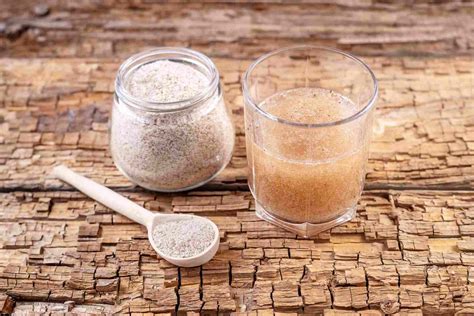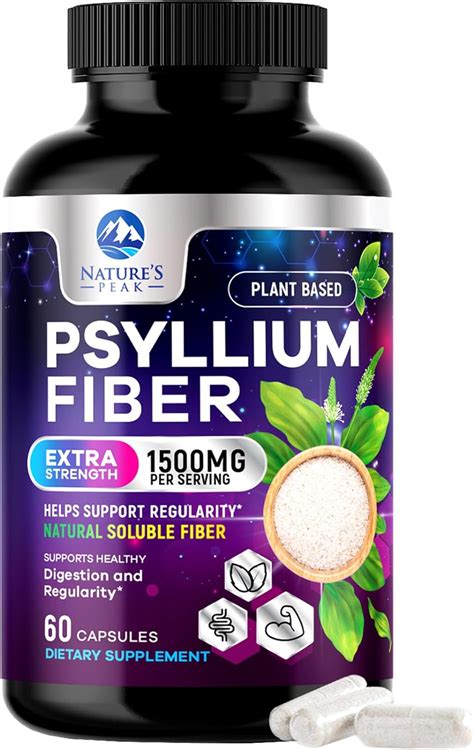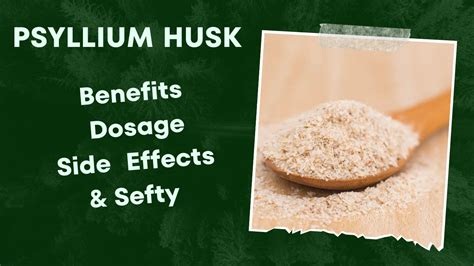Intro
Discover the benefits of psyllium, a natural fiber supplement, and learn how it supports digestive health, promotes regularity, and helps lower cholesterol, with its prebiotic and soluble fiber properties.
The importance of maintaining a healthy digestive system cannot be overstated. A well-functioning digestive system is crucial for overall health, as it enables the body to absorb essential nutrients from food. One natural ingredient that has been used for centuries to support digestive health is psyllium. Psyllium, also known as ispaghula, is a type of fiber derived from the seeds of the Plantago ovata plant. It has been used in traditional medicine for its laxative properties and is now widely recognized as a beneficial supplement for promoting regular bowel movements, lowering cholesterol levels, and controlling blood sugar levels.
Psyllium has been the subject of extensive research, and its benefits are well-documented. The fiber works by absorbing water in the intestines, swelling to form a gel-like substance that helps soften stool and make it easier to pass. This natural bulking agent can help prevent constipation, diarrhea, and other digestive disorders. Furthermore, psyllium's soluble fiber content can help slow down the absorption of sugar and cholesterol from the gut, which can contribute to improved blood sugar control and lower cholesterol levels. With its numerous health benefits and natural origin, psyllium has become a popular dietary supplement among health-conscious individuals.
The use of psyllium as a dietary supplement has gained significant attention in recent years due to its potential to support overall health and well-being. Psyllium is available in various forms, including powder, capsules, and granules, making it easy to incorporate into one's daily routine. Many people take psyllium as a supplement to support digestive health, while others use it to help manage chronic conditions such as irritable bowel syndrome (IBS), high cholesterol, and type 2 diabetes. As research continues to uncover the benefits of psyllium, its popularity as a natural health remedy is likely to grow.
What is Psyllium?

Psyllium is a type of soluble fiber that is derived from the seeds of the Plantago ovata plant. The seeds contain a high amount of mucilage, a gel-like substance that swells when it comes into contact with water. This mucilage is responsible for the fiber's laxative properties and its ability to form a gel-like substance in the intestines. Psyllium is available in various forms, including whole seeds, ground seeds, and purified mucilage extracts. The most common form of psyllium is psyllium husk, which is the outer covering of the seed that contains the majority of the mucilage.
Benefits of Psyllium
The benefits of psyllium are numerous and well-documented. Some of the most significant advantages of taking psyllium as a dietary supplement include: * Promoting regular bowel movements and preventing constipation * Lowering cholesterol levels and reducing the risk of heart disease * Controlling blood sugar levels and managing type 2 diabetes * Supporting healthy gut bacteria and boosting the immune system * Aiding in weight management and reducing hungerHow Does Psyllium Work?

Psyllium works by absorbing water in the intestines and swelling to form a gel-like substance. This gel-like substance helps soften stool and make it easier to pass, reducing the risk of constipation and promoting regular bowel movements. The soluble fiber in psyllium also helps slow down the absorption of sugar and cholesterol from the gut, which can contribute to improved blood sugar control and lower cholesterol levels. Additionally, psyllium's prebiotic properties help support the growth of healthy gut bacteria, boosting the immune system and promoting overall health and well-being.
Types of Psyllium
There are several types of psyllium available, including: * Psyllium husk: This is the most common form of psyllium and is derived from the outer covering of the seed. * Psyllium seeds: Whole psyllium seeds can be used as a dietary supplement, but they may be more difficult to digest than psyllium husk. * Psyllium powder: Psyllium powder is a purified extract of the mucilage from the seeds and can be mixed with water or other liquids to form a gel-like substance. * Psyllium capsules: Psyllium capsules are a convenient way to take psyllium as a dietary supplement and are often available in various dosages.Psyllium and Digestive Health

Psyllium is perhaps best known for its ability to support digestive health. The fiber works by absorbing water in the intestines and swelling to form a gel-like substance that helps soften stool and make it easier to pass. This can help prevent constipation, diarrhea, and other digestive disorders. Additionally, psyllium's prebiotic properties help support the growth of healthy gut bacteria, boosting the immune system and promoting overall health and well-being. Many people take psyllium as a supplement to help manage chronic digestive conditions such as irritable bowel syndrome (IBS), inflammatory bowel disease (IBD), and diverticulitis.
Psyllium and Cholesterol
Psyllium has been shown to help lower cholesterol levels and reduce the risk of heart disease. The soluble fiber in psyllium helps slow down the absorption of cholesterol from the gut, which can contribute to lower cholesterol levels. Additionally, psyllium's ability to promote regular bowel movements and support healthy gut bacteria can help reduce inflammation in the body, which is a major risk factor for heart disease. Many studies have demonstrated the effectiveness of psyllium in reducing cholesterol levels and improving overall cardiovascular health.Psyllium and Blood Sugar Control

Psyllium has been shown to help control blood sugar levels and manage type 2 diabetes. The soluble fiber in psyllium helps slow down the absorption of sugar from the gut, which can contribute to improved blood sugar control. Additionally, psyllium's ability to promote regular bowel movements and support healthy gut bacteria can help reduce inflammation in the body, which is a major risk factor for developing type 2 diabetes. Many studies have demonstrated the effectiveness of psyllium in reducing blood sugar levels and improving overall glucose metabolism.
Psyllium and Weight Management
Psyllium has been shown to aid in weight management and reduce hunger. The fiber works by absorbing water in the intestines and swelling to form a gel-like substance that helps keep you feeling fuller for longer. This can lead to a reduction in calorie intake and an increase in weight loss. Additionally, psyllium's ability to promote regular bowel movements and support healthy gut bacteria can help reduce inflammation in the body, which is a major risk factor for obesity. Many people take psyllium as a supplement to help support their weight loss goals and improve overall health and well-being.Side Effects of Psyllium

While psyllium is generally considered safe and well-tolerated, there are some potential side effects to be aware of. These may include:
- Bloating and gas
- Abdominal cramps
- Diarrhea
- Constipation
- Allergic reactions
It is essential to start with a low dose and gradually increase as needed to minimize the risk of side effects. Additionally, it is crucial to drink plenty of water when taking psyllium to help the fiber move through the digestive system and prevent constipation.
Interactions with Medications
Psyllium may interact with certain medications, including: * Blood thinners * Diabetes medications * Cholesterol-lowering medications * Blood pressure medicationsIt is essential to consult with a healthcare professional before taking psyllium, especially if you are taking any medications or have any underlying health conditions.
Conclusion and Final Thoughts

In conclusion, psyllium is a natural and effective way to support digestive health, lower cholesterol levels, and control blood sugar levels. With its numerous health benefits and low risk of side effects, psyllium has become a popular dietary supplement among health-conscious individuals. Whether you are looking to promote regular bowel movements, manage chronic digestive conditions, or simply support overall health and well-being, psyllium is an excellent addition to your daily routine. As with any dietary supplement, it is essential to consult with a healthcare professional before taking psyllium, especially if you have any underlying health conditions or are taking any medications.
We invite you to share your thoughts and experiences with psyllium in the comments below. Have you taken psyllium as a dietary supplement? What benefits have you experienced? Do you have any questions or concerns about psyllium? We would love to hear from you and help you on your journey to optimal health and well-being.
What is psyllium and how does it work?
+Psyllium is a type of soluble fiber that works by absorbing water in the intestines and swelling to form a gel-like substance that helps soften stool and make it easier to pass.
What are the benefits of taking psyllium as a dietary supplement?
+The benefits of taking psyllium include promoting regular bowel movements, lowering cholesterol levels, controlling blood sugar levels, and supporting healthy gut bacteria.
Are there any potential side effects of taking psyllium?
+Yes, potential side effects of taking psyllium include bloating and gas, abdominal cramps, diarrhea, constipation, and allergic reactions.
